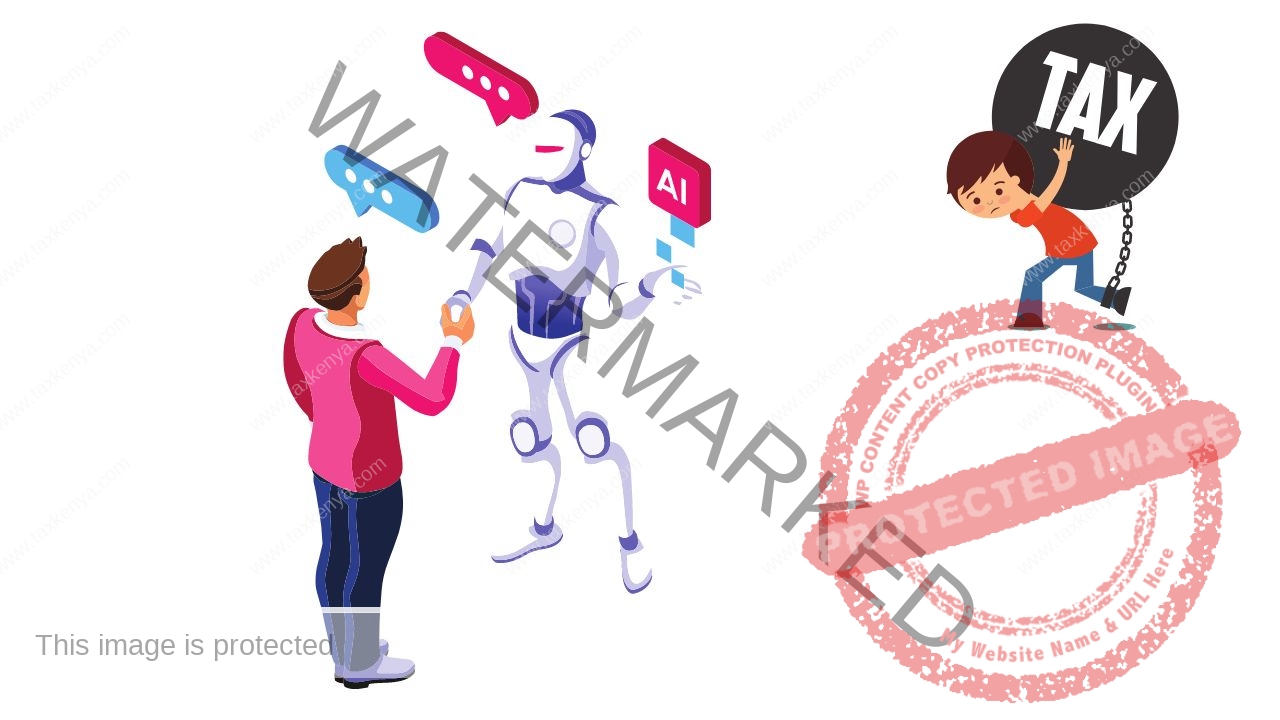Artificial intelligence, or AI, can change how governments collect tax revenue. AI can process massive data amounts. This will help governments streamline tax collection processes and improve efficiency. Already many governments are using AI in tax collection for example income tax.
a. Affiliate Disclosure: These are affiliate links from which we receive a commission at no cost. Read full Affiliate marketing disclosure HERE.
b. Tax Contents Disclaimer: The tax industry in Kenya is very dynamic. The tax contents in the posts are not professional advice. Read full disclosure HERE.
The adoption of AI in tax revenue collection also presents challenges, including cost and security concerns. In this article, we explore the opportunities and drawbacks of AI. We will also discuss the ethical considerations involved.
Governments are increasingly adopting the use of AI in tax collection processes and tax revenue for example KRA iTax . They need to understand its potential benefits and drawbacks in tax collection processes.
Overview of Current Tax Collection
Traditionally, governments have relied on manual processes and human intervention to collect tax revenue. This is a time-consuming and error-prone process. The manual processes cannot keep up with the growing volume and complexity of tax data.
Additionally, the processes are vulnerable to fraud and tax evasion. Hence governments are not collecting all the tax due, and not all taxpayers are tax compliant.
To address these challenges, many governments are adopting technology. Many governments are adopting AI in tax collection processes.

AI For Tax Collection
AI is being adopted to automate and streamline tax revenue collection processes. Using AI improves the capability to process and analyze vast amounts of data fast and accurately. Hence, it is well-suited for scrutiny of tax compliance and fraud detection.
For example, AI-powered automated tax systems can handle the filing and processing of tax returns, as well as identify and prevent tax evasion and fraud. Automated systems can significantly reduce the time and resources required for tax collection.
The government can provide tools to expedite the processes, for example, etax filing, income tax calculators, and tax calculators. This will improve the accuracy and reliability of the processes. Some of the tax systems where the government can use AI are incometax, capital gains tax, stamp duty, car tax
In the next sections, we will explore the benefits and challenges of using AI in taxation, for example, tax revenue collection and how governments can overcome the challenges.
Potential Benefits of AI in Tax Collection
a. Increased Efficiency
Unlike humans, AI can process and analyze large amounts of data. The analysis is quick and accurate, thus well-suited for tax compliance and fraud detection scrutiny. By automating these processes, governments can significantly reduce the time and resources required for tax collection. This can lead to increased efficiency and a more streamlined experience for taxpayers.
b. Accuracy of Tax Collection
Using machine learning algorithms, AI can identify patterns and anomalies that may indicate tax evasion or fraud. This can help governments detect and prevent tax evasion and fraud, which can significantly impact tax revenue. AI will improve the accuracy of tax collection.
c. Preventing Tax Evasion
Ai has enormous potential to play a significant role in preventing tax evasion. AI can analyze tax data and identify patterns and anomalies indicating tax evasion. This can help governments detect and deter tax evasion activities. This will impact tax collection and tax revenue.
For example, AI can automate tax systems that handle the filing and processing of tax returns. The automated systems can identify discrepancies in tax returns and flag potential instances of tax evasion. Additionally, AI can also be used to monitor tax transactions and identify patterns that may indicate tax evasion.
d. Tax Fraud Detection
Traditional methods of tax fraud detection often rely on manual review, which can be time-consuming and prone to errors. AI can speed up the process and improve fraud detection accuracy, resulting in cost savings and increased government revenue. Hence, using AI in tax fraud detection can improve the accuracy and efficiency of the process.
e. Automation of Tax Processes
AI can be used to automate other tax processes. Tasks such as data entry, analysis, and reporting can be automated to reduce the time and resources required for these processes significantly. This will result in government cost savings and a more streamlined taxpayer experience.
For example, robotic process automation (RPA) is a software robot (or bots) used to automate data entry and analysis tasks. Depending on the task, these bots can work alongside human staff or independently.
f. Tax Assessments and Compliance
Using AI in tax process automation will improve the accuracy and reliability of the tax collection process. By automating tasks such as data entry and analysis, governments can reduce the risk of errors and enhance data quality. This can lead to more accurate tax assessments and improved tax compliance e.g. self assessment tax and tax return.
Using AI in tax collection can significantly improve efficiency and accuracy, resulting in cost savings and increased government tax revenue.
However, the adoption of AI in tax collection also presents challenges. In the following sections, we will examine some of these challenges and how governments can overcome them.
AI Challenges in Tax Collection
As with any new technology, the adoption of AI in tax collection brings with it several challenges.
a. Cost
Implementing AI systems and processes is expensive. Governments may need to invest in new hardware and software and staff training. This can be a significant barrier for governments, particularly those with limited budgets.
b. Security
AI systems handle sensitive financial and personal data. It is essential to ensure the systems are secure and protected against cyber threats. Governments must invest in security measures such as encryption and secure data storage to protect against breaches and cyber-attacks.
c. Resistance to Change
People do not embrace change readily. There may be resistance to change from staff and taxpayers. As AI becomes more widely adopted in the field of tax revenue collection, there will be implications for employment in this sector. AI will result in the automation of specific tasks, potentially reducing the need for human staff in some areas.

Adopting AI in tax revenue collection may also create new employment opportunities. For example, hiring staff with specialized AI and machine learning skills to develop and maintain the systems. Additionally, staff to oversee and manage the operation of AI systems or handle tasks that cannot be automated.
d. Tax Compliance Costs
AI has the potential to increase tax compliance costs. Taxpayers will be required to procure AI systems to be integrated with those of the government. Additionally, since AI will detect tax evasion and tax fraud, non-compliant taxpayers may resist using AI. For example adoption of new ETR machines.
Ethical Considerations of Adopting AI in Tax Collection
AI is a technology. The use of all forms of technology raises ethical considerations. AI in tax collection also raises several ethical concerns. The following are two key considerations.
a. Fairness
AI systems are based on data. If AI is trained on biased data, the results will be biased. For example, if an AI system is trained on tax data that is disproportionately made up of data from one particular group, the system may be biased in favor of that group. Governments must use diverse and representative data to train their AI systems. This will avoid bias and ensure fairness.
b. Accountability
Data errors or issues will arise as governments adopt AI in tax collection. Governments must ensure transparency and accountability in using AI in tax collection. This may require developing policies and procedures for using AI in tax revenue collection and establishing mechanisms for oversight and accountability.
The use of AI in tax collection presents several ethical considerations that governments will need to carefully consider and address to ensure the technology is used ethically and responsibly.
Conclusion
As AI advances and becomes more widely adopted, its use in tax revenue collection will likely become more common. AI has the potential to change the way governments collect taxes. AI can process and analyze vast amounts of data quickly and accurately. This can help governments streamline their tax collection processes, improve efficiency and accuracy, and minimize tax costs.
However, adopting AI in tax revenue collection also presents challenges, including increased cost and security concerns. Additionally, there is the potential impact on employment in the tax sector and ethical considerations surrounding the use of AI.
The use of AI in tax revenue collection presents both opportunities and challenges. Governments must carefully balance AI’s benefits with the concerns raised to ensure the technology is used responsibly and ethically.
Thank you for reading the post.
Inform us using the provided contact details and tell us what other affects AI is likely to have on tax.
Dr. Wakaguyu.
Grab a FREE book!








